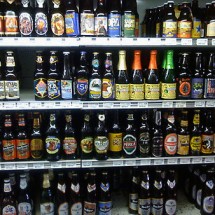Law Offices of John P. Connell, P.C.: As reported in today’s Boston Globe, Night Shift Brewing Company of Everett, a farmer-brewer licensed pursuant to G.L. c. 138, section 19C, has commenced its own wholesaler business pursuant to G.L. c. 138, Section 18, so as to avoid using the more established wholesalers/distributors in Massachusetts. Such traditional brewer-wholesaler distribution arrangements reduce significantly the bottom line income for beer sold by a brewery and come with the franchise entanglements of G.L. c. 138, Section 25E. You can read the Boston Globe article here.
Night Shift’s significant investment into a warehouse located in Chelsea marks a new chapter in the state’s continuing battle between brewers, on the one hand, and wholesalers, on the other hand, over when a brewer must start using a wholesaler and under what circumstances a brewer can someday terminate the relationship. Currently, when a brewer makes at least six months of regular shipments to a Massachusetts wholesaler of a particular brand, in the absence of a written contract that otherwise defines the terms of the relationship, the brewer must continue to honor sales requests for that brand from that wholesaler going forward unless the brewer can show “good cause” under Section 25E, a difficult, lengthy and expensive procedure before the Massachusetts Alcoholic Beverages Control Commission should the wholesaler object to the attempt to terminate.
Also, as farmer-brewers are currently authorized to “self distribute” – or sell directly to retailers – up to 50,000 gallons of beer annually (only about 1,613 barrels), farmer-brewers reaching annual production in this area of production are being faced with the prospect that they must start using a wholesaler or otherwise potentially run afoul of the law.
Brewers, such as Night Shift, seek to avoid these so-called franchise entanglements and the significant cost of using a traditional wholesaler by creating their own distributorship, where there is both the franchise relationship and cost still involved, but controlled by the brewer (or its principals) rather than a third party. Under Massachusetts law, such an arrangement is permissible, but with caveats.
First and foremost, while owners of a corporate entity with a farmer-brewery license and (according to the ABCC) that corporate entity itself cannot possess an ownership interest in a business that possesses either a Section 12 pouring license, such as restaurants, or a business that possesses a Section 15 off premises license, such as liquor stores, farmer-brewers (and their shareholders) licensed pursuant to G.L. c. 19C may possess an ownership interest in not more than one (1) business that possesses a Section 18 wholesaler’s license. See G.L. c. 138, Section 19C(a)(5).
A Massachusetts wholesaler needs to be licensed by TTB and ABCC; they need to have an approved warehouse where shipments are received and come to rest; and they need the attendant transportation and salesmen permits in order to transport and solicit sales from retailers. Massachusetts wholesalers can possess either an all alcoholic beverages license (the cost of which is $10,000.00 annually) or a beer and wine license (the cost of which depends on the amount of gallons purchased annually (ranging from $3,500.00 to $5,000.00). Once licensed, the wholesaler can purchase other products from other Massachusetts’ manufacturers; from out-of-state manufacturers; and even import products from abroad if licensed by the TTB as both an importer and wholesaler.
Selling alcoholic beverages wholesale to retailers has been traditionally an entirely different business model from that of operating breweries, but craft brewers in Massachusetts have been learning as they go and are becoming quite proficient in establishing their own retail networks as they get their businesses up and running. Established wholesaler businesses have traditionally focused their models on the expenses associated with temperature controlled storage and trucking; sales people who are good at selling products (as opposed those who are good at making products); and have established long standing personal relationships with the people who actually choose which brands to purchase at the retail level. There is also a separate set of regulations attendant to operating a wholesale business such as pricing, volume discounting, providing credit to retailers and other practices which are not necessarily “second nature” for those whose experience in the industry has been just the manufacturing of beer.
Going wholesale, however, is taking root as a viable option for brewers seeking to re-invent the market of craft beer distribution market in Massachusetts, and it appears to be consistent with and an extension of the entrepreneurial spirit and “can do” effort craft brewers brought to the beer manufacturing business in general, once dominated only by nationwide mass-producers of beer.
© Law Offices of John P. Connell, P.C. 2016

